Political Science Association Slams PM Andrej Plenković's Statements
ZAGREB, 1 June, 2021 - The Croatian Political Science Association (HPD) on Tuesday strongly condemned the criticism PM Andrej Plenković levelled against political scientist Dražen Lalić and the RTL broadcaster, noting that it was an attack not only on an individual but on all political scientists as well as media.
The HPD recalled Plenković's statement that "RTL hired Lalić to vilify (HDZ candidate for Zagreb mayor Davor) Filipović in the worst way possible" and his remark that "those are not unbiased media" but "hirelings paid to demonise a political camp."
"Such an unsubstantiated verbal attack by the Prime Minister against our member and prominent Croatian researcher was not only an ad hominem attack - which as such makes his criticism invalid - but also an attack on the right to express one's opinion and on intellectual freedom. With his inappropriate act, Andrej Plenković has threatened the freedom to express one's professional views and additionally weakened the already weak position of the media," the association said.
It also notes that, considering the disproportion of powers, this type of attack by the PM on a member of the academic community and public intellectual has the potential to instil fear and insecurity in members of the academic community and media alike.
For more about politics in Croatia, follow TCN's dedicated page.
PM Andrej Plenković: Media Are Not Sacrosanct
ZAGREB, 1 June, 2021 - Prime Minister Andrej Plenković told reporters on Monday evening that earlier in the day, when he was commenting on the elections, he was telling the truth and that amounted to no attack on the media because the media, he said, were not sacrosanct that couldn't be talked about.
"I was just telling the truth," Plenković said when asked by reporters whether he had gone too far when commenting on the elections and criticisng several commercial broadcasters.
All those I talked about, including your broadcaster (RTL), used the wrong name of HDZ's candidate for Zagreb mayor in their shows, he said, adding that it had happened several times, even on another TV station and in some print media.
He said "these weren't slips of the tongue" and added that these things had clearly happened "on purpose". "This isn't criticism, I was telling the truth, it isn't an attack on the media. The media aren't sacrosanct so that we cannot talk about it," Plenković said.
Commenting on the statement that the Croatian Journalists' Association (HND) called on him not do it and that it was not his first time, Plenković said that that was "a rude and inappropriate statement by the HND president, who is much more slower and evasive when it comes to criticising (President Zoran) Milanović".
Milanović, he stressed, calls out on the media in a much harsher way. He calls the HRT Yutel, HRT reporters mercenaries of a political party, he calls daily newspapers usurers, he calls on your leadership to remove commentator (Žarko) Puhovski and after that I no longer see him in your (RTL) programme, Plenković said.
He said that HND president Hrvoje Zovko was "much more considerate" when it came to reacting to Milanović. Here he dares to talk about me as Lukashenko, Plenković noted, adding that this was going beyond all bounds, which could be classified as being biased.
It is one thing when those running in the election face off in a political match, and another when someone who presents himself as an independent analyst to the viewers, and they don't know whether you are paying him for it, describes a candidate before the elections in the worst possible way, Plenković said, referring to Dražen Lalić's comments for the RTL.
He recalled that it was not unusual for the media in the world to follow one political option.
There are no newspapers in the world for which one doesn't know whether they're left-wing or conservative, he said.
We cannot, he said, live in the belief that everyone is neutral, impartial, objective and in reality they support some option. "One shouldn't be ashamed of that, but it must be clearly stated," Plenković added.
There are double standards
Plenković also thinks that the media had been generating aggression toward the HDZ and the two key candidates in two big cities.
He said that the public had to realise there were double standards.
Asked to comment on Ivica Puljak's victory in Split, he countered with a question -- how can he have an anti-Semite for deputy mayor.
"The man practically wrote a justification for the Holocaust, and if you don't realise that, then you have a dangerous problem," Plenković said, adding that if it was happening elsewhere, "all associations would attack Puljak".
For more about politics in Croatia, follow TCN's dedicated page.
Žarko Puhovski: "Is PM Plenković's Attack on Lalić More Significant Than President Milanović's On Me"?
ZAGREB, 1 June, 2021 - Professor and political analyst Žarko Puhovski said on Monday that he was shocked by the statement signed by the Croatian Journalists' Union (SNH) and the Croatian Journalists' Association (HND), wondering if Plenković's attack on analyst Dražen Lalić was more significant than Milanović's on him.
"Is it really possible that (Prime Minister) Plenković's scandalous attack on Lalić is so much more significant than (President) Zoran Milanović's much dirtier continuous attacks on me in the past months, and in the former case you reacted in the blink of an eye, while in the latter not at all?" asked Puhovski in an open letter, adding that despite his years and experience, he is truly shocked by the statement the SNH co-signed today.
"I don't know if it's about likes/dislikes, ideology, stupidity or rudeness, but I didn't expect that from you at least," Puhovski told the SNH.
The HND and the SNH said earlier on Monday that they strongly condemned PM Andrej Plenković's attack on the media, interference in the editorial policy of commercial broadcasters RTL, Nova TV and N1 and criticism of the reporters and pundits covering campaigns in the run-up to the recent local election and the elections.
PM Andrej Plenković then said HND president Hrvoje Zovko's statement was "rude and inappropriate" and said he was "much quieter, slower and more evasive when it comes to criticising Milanović".
For more about politics in Croatia, follow TCN's dedicated page.
Zagreb Local Elections 2021 Analysis: No "Ideological Referendums", Strictly Freedom And Solutions Wanted
May 30, 2021 - Following the turbulent public debate of the Zagreb mayor candidates that ended with Tomislav Tomašević winning the capital of Croatia, TCN reporter Ivor Kruljac brings you the Zagreb Local Elections 2021 Analysis, concluding that Zagreb is a city open for all ideologies but in constant search of quality solutions.
It's official – Tomislav Tomašević (seen on the lead image) is the new mayor of Zagreb, the 54th in a row when you look through Zagreb's history.
As a brand new chapter in Zagreb's local politics is turned, many are still uncertain about whether the former mayor Milan Bandić would lose or win another mandate if he hadn't suddenly and prematurely passed away earlier this year. Still, as Jelena Pavičić Vukićević, Bandić's successor joined the mayoral race and came in third place (despite being perceived as the keeper of Bandić's tradition), we could argue that is the indication that Bandić being suspected of corruption (and taken to court on several occasions) could've been the political end for him, had he lived to see the fight. But, of course, given Bandić's strong personality, that indication needs to be taken with a grain of salt, as many believe that not only would Bandić get to the second round of elections - but he'd even win them.
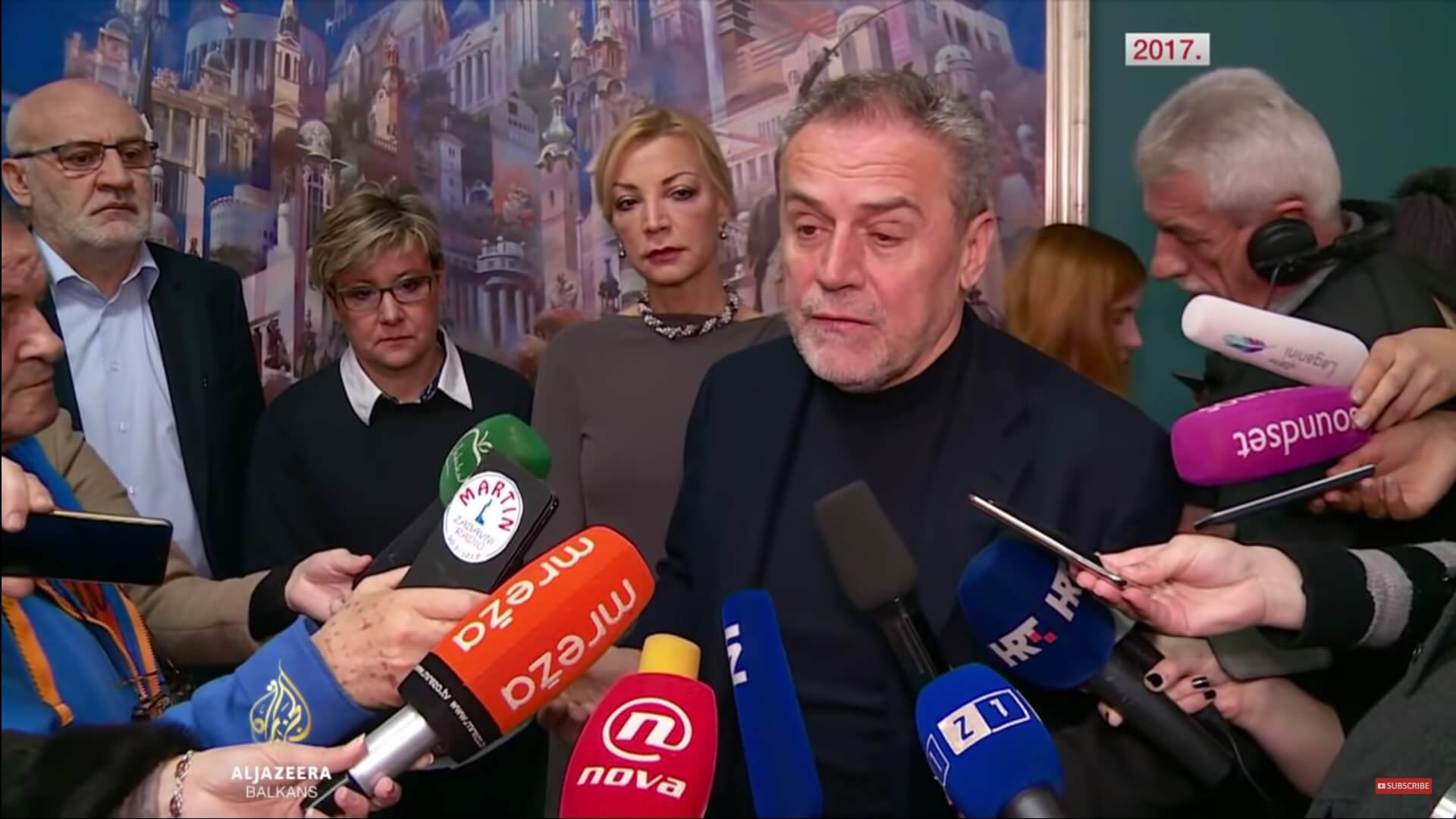
Former Zagreb mayor Milan Bandić, screenshot / Al Jazeera Balkans
A quick recap
In the first round, Tomislav Tomašević from the green-left platform We Can! (Mozemo!) earned a stunning 45,15 percent (147,631) votes. Not only was that twice as more than Škoro and Pavičić Vukičević combined, as N1 reported, but it was also more than with what Milan Bandić won in the second round of local elections back in 2017.
The mayoral race in Zagreb was highlighted with the question of who will succeed Milan Bandić and who will properly address all the debts and unfairly earned employment in the city administration as well as the overpricing of numerous city projects (such as the many fountains and the plagued Sljeme cable car). Additionally, there were the issues of the handling the mess of the Jakuševec junkyard, as well as handling the post-earthquake reconstruction of Zagreb's very heart. The only thing the majority of the candidates agreed to be good were the city's social policies, but they can still be improved.
However, as TCN previously reported, before even officially entering the second round, Miroslav Škoro turned the elections from practical questions of handling corruption to the age old and frankly boring ideological battle, accusing Tomašević and the We Can! (Mozemo!) platform of wanting to revive Yugoslavia.
''That's the extreme left, and it will be stopped in the second round, so help me God“, said Škoro on the night of the first election results.
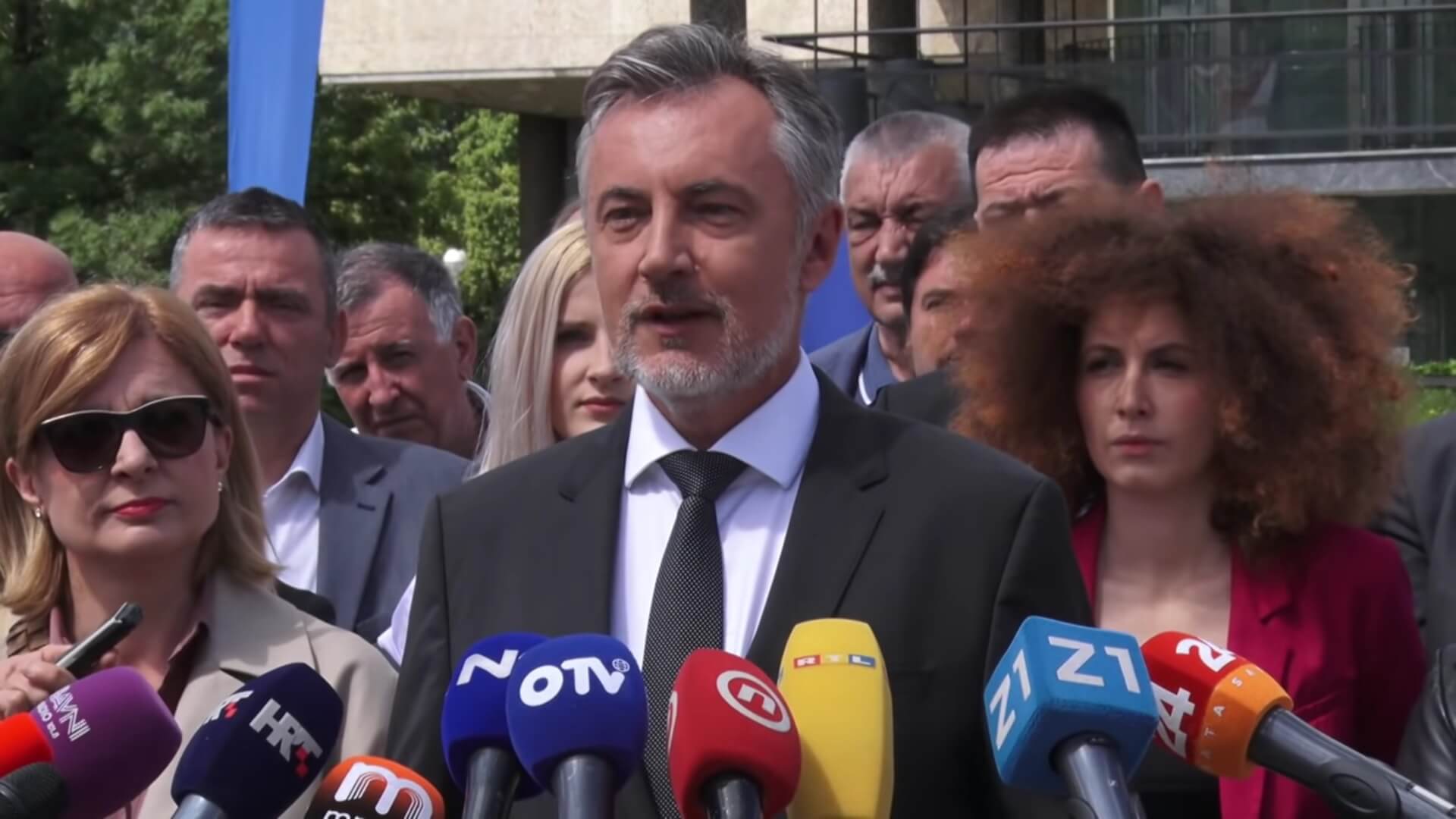
Miroslav Škoro, screenshot / Domovinski Pokret
This sort of rhetoric took everyone by surprise. Dražen Lalić, a sociologist and a professor at the Faculty of Political Sciences at the University of Zagreb, commented for RTL that Škoro himself is a radical candidate and that We Can! (Mozemo!) are neither extreme nor are they the radical left.
''Regardless of Škoro having a doctorate in economis, he's illiterate in the political sense; he doesn't know even the most basic terms. Extreme means outside of the system and not going to the elections. Radical actors are inside the system, and I think Škoro is radical. On the other hand, Tomašević and We Can! (Mozemo!) are very moderate in their attitudes; they're young people. There were no incidents and they are were moderate,'' said Lalić for RTL. He added that Škoro is probably aware that he had absolutely chance of winning but was still trying to reach the far-right electoral body.
24sata columnist Tomislav Klauški wrote about how Škoro's war with the perceived ''extreme left'' is quite literally the only thing in his entire programme. He concluded that such a move isn't going to work for Zagreb, which has never voted for far right options, and he also reminded that former mayor Milan Bandić, despite his many flaws, also came from the social-democratic political option.
''His filthy campaign from the first round, where his agency spread lies that Škare Ožbolt works ''for the Serbs'', where his news sites spread stories that Filipović's father is Serbian, and warned that Tomašević is a concealed right-winger, Škoro is now going further with that into the second wrong. As if Zagreb doesn't have enough problems to talk about,'' wrote Klauški on Monday after the first round.
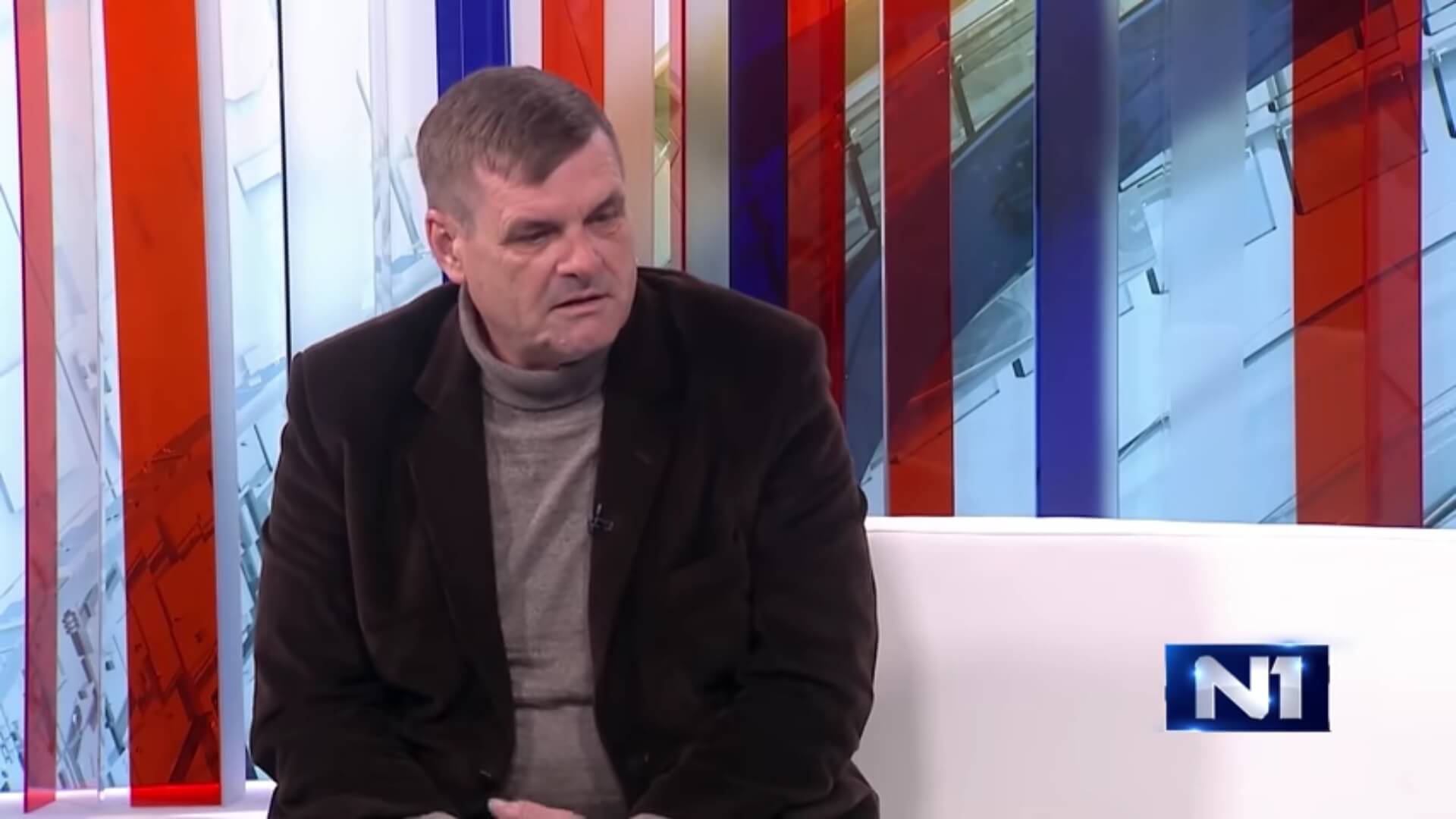
Dražen Lalić, screenshot / N1
Škoro then continued to push the narrative of these elections, declaring them an ideological referendum among right-wing and conservative circles. Škoro also accused We Can! (Mozemo!) of being foreign mercenaries working for famous philanthropist George Soros or wanting to revitalise Yugoslavia, and Škoro's associate Zlatko Hasanbegović stepped out into the Croatian public space calling the party a lesbian syndicate - weird indeed. Additionally, Nikola Grmoja (Most) stated for N1 that Mozemo are iPhone Soroshians, and accusations accompanied by rather odd name-calling saw a random generator on the internet designed to mock these terms by random options. Meanwhile, Tomašević continued his campaign by talking about solutions to the problems Zagreb is currently facing but occasionally making remarks on the accusations by his opponents and sometimes even throwing some accusations in Škoro's direction in return.
67% : 33% K.O.
This focus on actual problems Zagreb is facing and the refusal to dwell into ideological issues, along with the experience of activism for Zagreb's interests, proved to be the winning formula for Tomašević, beating Škoro with amazing 199,630 votes compared to Škoro's 106.300 votes. Not only did Tomašević beat Škoro by far, he also earned more than former mayor Milan Bandić did, and nobody has had more votes in Zagreb's mayoral elections to date.
Škoro lost his own so-called ideological referendum, but let's imagine for a moment that he actually won. Whether Škoro (or some other analysts who believed these elections would finally prove how Zagreb looks at things with an ideological eye) likes it or not, this "referendum" neither proves that Zagreb has turned to some radical left nor does it prove the opposite. First of all, only 45.7% of people voted on the second round of these elections. That's not even half of the total number of citizens that have the right to vote in Zagreb. Secondly, the culture and overall vibe of Zagreb truly tells us that Zagreb is diverse and very much open for everybody.
Zagreb - The pioneer liberal city for every idea
One thing we can say for certain about Zagreb's philosophy, if you will, is that Zagreb is proud to be a pioneer of development and a role model for the rest of the country. To illustrate that, Zagreb was proud that they'd be the first to use telecom lines, and by the time the rest of Croatia got telephones, Zagreb already had mobile phones. Being the capital city of Croatia, and the biggest city in the country, a centre of politics, education, science, culture, and more, Zagreb attracts people from all over the country and abroad, having bloomed into a multi-cultural city whose people have various ideologies and convictions.
When you look at ideological conflict in Croatia, which sadly doesn't seem to be anywhere near its end, it is often perceived that if you're a Croatian nationalist and conservative in Istria, you'll feel quite lonely indeed. On the other hand, left leaning progressives and liberals living in Dalmatia or Slavonia, areas that are known to be quite conservative, can't wait for a chance to leave those areas.
That being said, apologetics of all ideologies head to Zagreb, and Zagreb is a place where looking straightly from an ideological view, everyone is equally happy and miserable at the same time, but overall they're in a better position than in the rest of Croatia is. Before the pandemic, you had a regular event called ''Coffee with non-believers'' hosted by various venues such as Spunk bar or No Sikiriki. The event allowed for all atheists, agnostics, or even religious people unhappy with the breach of secularity by the Catholic Church in Croatia – to find those who think like they do, meet in person, talk, and have a good time.
On the other hand, in the Veliki Tolk pub in Opatovina, you have ''Right-wingers in the Pub'' which provides the same comfort and good times for the conservative-oriented people.
Regardless of what kind of genre of music you listen to, what movies you want to see, what kind of clubs you want to go to, mainstream pop, alternative rock, electronics, jazz... Zagreb's public sphere offers something for everyone.
Zagreb does have hospitals whose doctors refuse to perform abortions, but if there is any place a woman can have her reproductive rights respected in Croatia, then that place is Zagreb. Despite several violent homophobic incidents, the relaxing atmosphere of the LGBTQ Pride picnic on Ribnjak Park, and the support coming for the parade from the windows of Zagreb's buildings show that Zagreb is a safe place, and you won't feel alone because of your sexual preferences.
How these ideologies co-exist in being equally happy and miserable at the same time was perfectly demonstrated over the last two weeks. LGBTQ flags put out for the International Day Against Transphobia were torn down by vandals on the Victims of Fascism Square. A few days later, a pro-life initiative, Hod za Život“ (Walk for life) flags displayed on Ban Jelačić Square, were also quite quickly torn down. And the culmination of that event was seen on Saturday when the pro-life Walk For Life march was met with counter-protesters from Crveni Otpor (Red Resistance), which is pro-choice. So, as we can see, these ideologies create conflict at times, but more often, it's a peaceful co-existence. Equally miserable and happy at the same time, and still in a better position than the rest of the country.
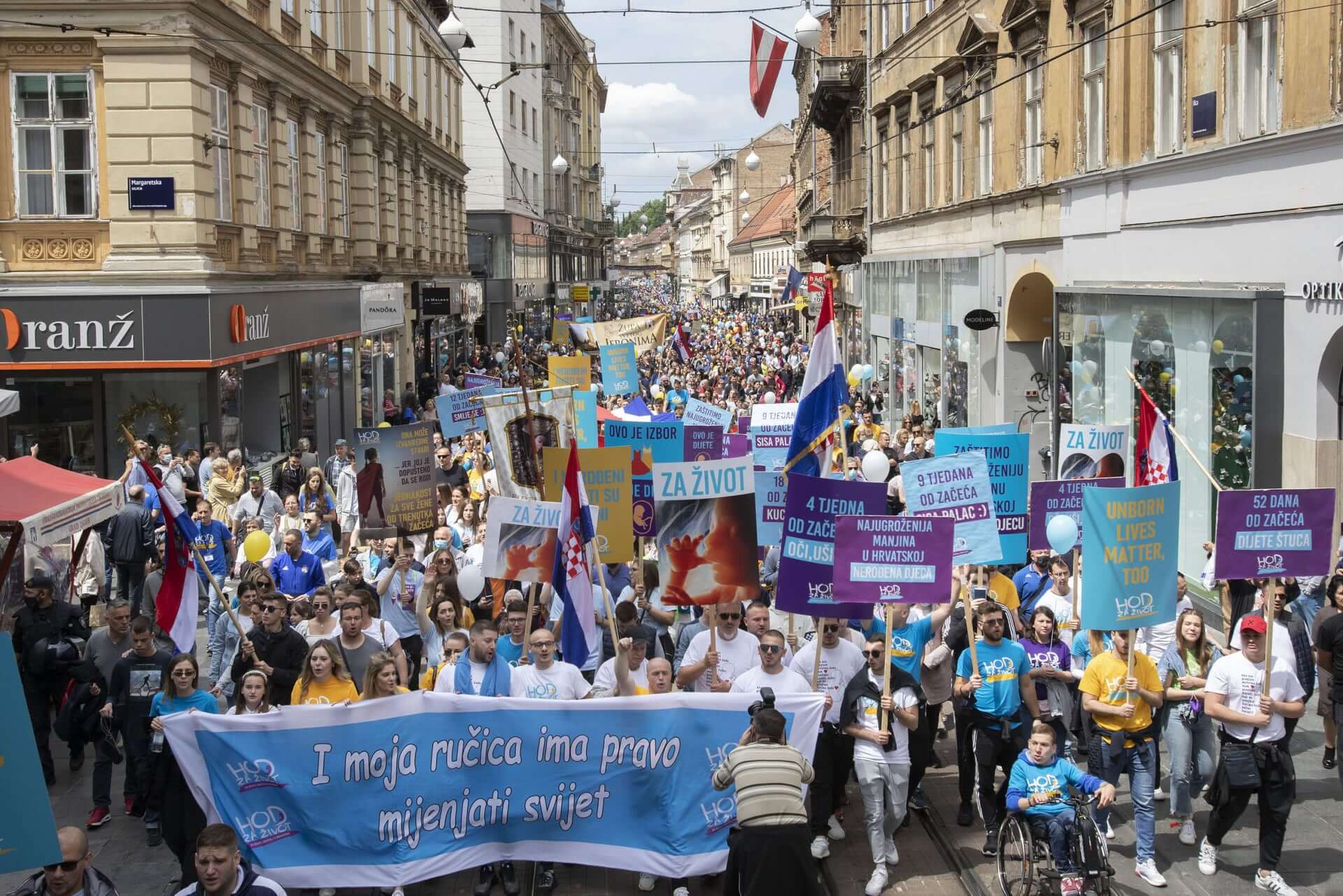
Pro-life march in Zagreb © Hod za život - Zagreb
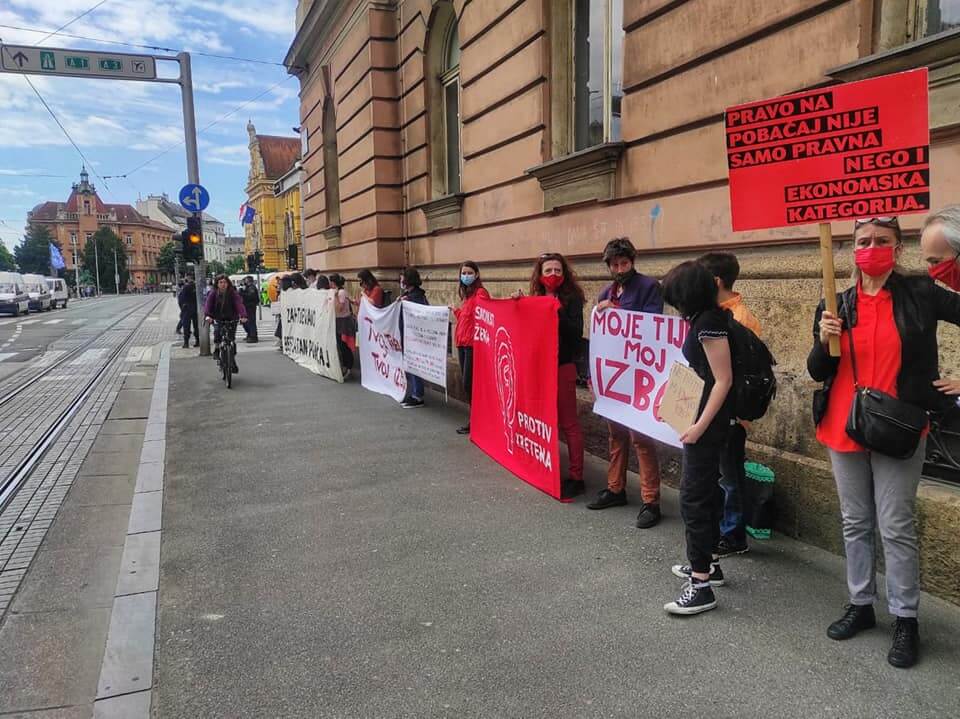
Pro-choice protesters waiting for pro-life march in Zagreb © Faktiv
Zagreb is liberal in its nature, courtesy of the growth and development it has seen, and even in the event that a conservative or even a radical conservative ever took the mayoral position, Zagreb wouldn't lose what it is in its soul.
Those who vote in Zagreb proved that ideological disputes are irrelevant, as long as freedom is respected by the candidate, and as long as you are not a radical and have a good solution for the city's problems, you're more than welcome to try and be a mayor.
Democracy is yet to be understood
That being said, there are some issues these elections highlighted for the political culture of Zagreb. First, Zagreb citizens that don't vote need to understand that voting is very important as our democratic right to have our say in what we want in Zagreb (as in the entire country). The freedom and all of the perks of living in Zagreb that citizens enjoy or don't enjoy are the direct results of politics, and any improvements or downfall in the city will come from politics. Having your say in these dynamic events is something that shouldn't be missed.
Democracy isn't a once-every-four-year event but a continuous practice of civic participation to make sure that promises before the election don't end up forgotten after the celebration.
Tomašević has said that "Zagreb is ours" (as is the name of one of the political parties in the Mozemo! platform), and so it's important for him to be open for the city's citizens, but also for citizens to be open to communicate with the local authorities to make a better community.
Learn more about Zagreb on our TC page.
For more about politics in Croatia, follow TCN's dedicated page.


